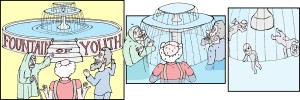March 2nd, 2012
Curses and Blessings of Aging
Gopi Astik, MD
It seems that every time I am in clinic, patients bring in supplements they bought to prevent aging. I usually look at the product ingredients, which include vitamins and herbs, and ask myself three questions:
1. Why didn’t I market this? I could put vitamins and herbs together and sell it to the baby boomers saying it prevents wrinkles and Alzheimer’s and make myself a nice chunk of change.
2. Don’t they read the ingredients or ask somebody before spending this money?
3. See #1.
When this happens, I calmly look at the bottle and usually tell patients that the product doesn’t contain any harmful ingredients and advise them that it would be cheaper to take the multivitamin I had already prescribed than spend extra money for this concoction. Everyone is looking for the secret cure to aging that simply doesn’t exist…yet.
A recent summary in Journal Watch General Medicine describes a Mayo clinic study in which senescent cells were marked and destroyed with a compound. When transgenic mice carrying the marker were bred with mice that age prematurely, the animals did not develop age-related disorders and other diseases progressed slowly. Although this technique isn’t being studied in humans yet– and probably won’t help my 87-year-old patient do her “BINGO dance,” — the study paves the way for such research to begin and shows promise for younger folks like me.
On the flip side, another study summarized in Journal Watch alluded to overscreening for cancer in elderly patients. This issue actually came up for me and my medical students this morning. When we looked up guidelines about cancer screening, there were so many different guidelines, it was hard to know which ones to follow.
The patient was a 76-year-old man who had his last colonoscopy at age 65, and a recommendation for 10-year follow up was noted. When comparing guidelines, USPSTF recommends screening for adults aged 50-75, National Cancer Institute recommends screening for adults ages 50-80, and the American Cancer Society recommends screening beginning at age 50 with no upper age limit. With my limited experience and the fear that I could miss something, I erred on the side of caution and told the patient that I would like to screen him again, and he declined. I am probably one of the physicians contributing to overscreening of cancer in elderly patients, but guidelines would be a lot easier to follow if there weren’t so many conflicting ones in the first place.
I also find patients less and less apt to actually have tests done as they get older. A patient today excitedly told us she had earned the right to not have mammograms or pap smears by living to the age of 85. When I asked her about the downside of aging she said, “Honey, I’ll deal with my wrinkles just don’t ever ask me to put my legs in stirrups again.”




Remember what Mark Twain said
” Growing old is an issue of Mind and Matter:
If YOU do not Mind, it does Not Matter.!”